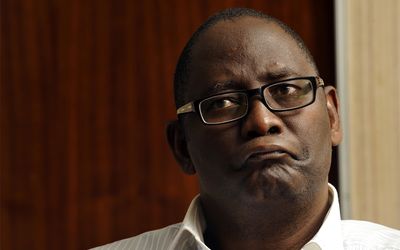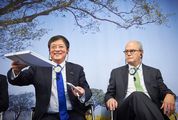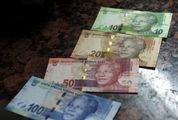CONGRESS of South African Trade Unions (Cosatu) general secretary Zwelinzima Vavi did not have much to say when he arrived at a quiet voting station in Morningside, Johannesburg to cast his ballot on Wednesday afternoon.
Mr Vavi casting his ballot followed that of President Jacob Zuma and other prominent politicians such as Deputy President Kgalema Motlanthe, Democratic Alliance (DA) leader Helen Zille, Agang SA leader Mamphela Ramphele and Economic Freedom Fighters leader Julius Malema.
Mr Zuma voted in Nkandla, KwaZulu-Natal, not far from his estate, the subject of much controversy because of the misuse of public money for "security upgrades" including a swimming pool and amphitheatre.
Mr Zuma, who appears on the national ballot as the African National Congress’ (ANC’s) presidential candidate, welcomed an Electoral Court ruling that a DA SMS campaign saying he had stolen money to add security arrangements to his Nkandla estate was based on false information. He said it was "as clear as anything" that the SMS was incorrect in stating that he stole taxpayers’ money to upgrade his private home.
The Electoral Commission of South Africa (IEC) said 25.3-million South Africans had registered to vote in the country’s fifth democratic national election, taking place just days after the 20th anniversary of the first democratic election on April 27 1994. About 31-million South Africans are eligible to vote, given their age.
Mr Vavi has found himself having to walk a wobbly tightrope, as he has had to campaign for the same ANC which he has vocally criticised in the latter years of Mr Zuma’s first term as president of South Africa.
The labour leader has come full circle, from being one of Mr Zuma’s staunchest supporters and terming his meteoric rise to the top of the ANC in 2007 as a "tsunami" to slamming the Zuma-led government over its stance on labour broking, adoption of the National Development Plan (NDP) and the implementation of electronic tolls on Gauteng’s freeways.
Mr Vavi arrived at the Ernest Ullman Recreation Park voting station at 1pm, an hour after he was tipped to arrive. He wore a shirt in the colours of the South African flag and was accompanied by an entourage, who wore union and "hands off Numsa" T-shirts.
The National Union of Metalworkers of South Africa (Numsa), a Cosatu affiliate, told its approximately 232,000 members it would leave up to them the decision of whom to vote for.
Mr Vavi shook hands and took selfies with voters near him in the queue. He shared joked and quipped : "I know who I am voting for. I was under very strict instructions to vote wisely."
Mr Vavi also faces an uncertain political future at Cosatu as he is at odds with other leaders in the labour federation allied to the ANC. He recently returned to his office as general secretary after being suspended for having an extramarital affair with a junior employee of Cosatu.
Cosatu’s decision to suspend Mr Vavi was the straw that broke the camel’s back in tensions that saw the federation’s largest affiliate in membership numbers, Numsa, resolve to withdraw campaign and financial support for the ANC at the elections.
IEC vice-chairman Terry Tselane vowed on Wednesday that residents of areas that had experienced violent protests in the days running up to the polls would be given the opportunity to vote.
Areas including Bekkersdal on the West Rand and Gugulethu on the East Rand have seen tension and protests with an "anti-election" flavour as protesters attempted to declare their communities "no go areas" for electoral commission staff and officials.
The election turnout in the North West’s volatile Bloemhof area was still low at midday, despite heavy police and military presence in the area to maintain calm.
Bloemhof is among the election hotspots in the country. Residents embarked on a violent protest early last month and had vowed to boycott the elections.
They wanted the Lekwa Teemane municipality, which includes Bloemhof and Christiana, to be dissolved over allegations of corruption.
The protesters torched the houses of ANC mayor Moeder Makodi as well as those of the ANC councillors and the local police. More than 250 people were arrested.
In eight of the nine voting stations in Bloemhof on Wednesday, close to 500 people had cast their votes by midday, out of an estimated 12,000 registered voters. This equals a 4% voter turnout.
The highest number of votes, 150, were recorded in Bloemhof TLC, the only voting station in a white-dominated area in Bloemhof town.
The first voting station on the way to Boitumelong township, which has the most number of residents in Bloemhof (23,000), was empty. Presiding officer at Bloemhof primary Kgothatso Lehihi said only seven people had voted by 9am. The voting station in Coverndale, a coloured area, had 53 people by 10am.
Combined, the five other voting stations inside Boitumelong township (Boitumelong Hall, Thuto Lore Secondary School, AME, St John, Gaopalelwe Secondary School) had just over 275 voters by midday. The last voting station is in a farming area about 30km outside Bloemhof.
Residents in a Gugulethu informal settlement told BDlive on Tuesday that they wanted to vote but were not sure if they would be given the opportunity to do so after protesters burnt down a tent set up in the area as a voting station.
Mr Tselane said residents who lived in areas prone to protest violence could still vote.
"We will make sure everyone who can vote and would like to vote will be given the opportunity to do so. There is increased security and temporary stations will be set up in those areas. We will not allow violence to stop people from exercising their rights," Mr Tselane said.
The number of election incidents was significantly lower than in previous years, despite instances of delayed opening of polling stations due to logistical problems and community protests problems were not expected to persist through the course of the day, the commission said.
Chief electoral officer Mosotho Moepya, speaking at the commission’s command centre in Pretoria on Wednesday, said 95% of voting stations were running, despite several delays, including late arrival of staff. The number of instances was small compared to previous elections.
Despite unrest at Bekkersdal, where police nyalas and military vehicles lined the street on Wednesday morning after protesters burned down an IEC tent on Tuesday, and at Gugulethu on the East Rand, where a community policing forum and Transnet was also burned down on Tuesday, most polling was quiet.
Military vehicles were also deployed in Bushbuckridge, Mpumalanga, in a bid to ensure peace in an area that has been marked by ANC faction-fighting in recent weeks.
The battle centres on Bohlabela ANC regional chairman Mandla Ndlovu, who is accused of having too much of a vested interest in local businesses, thereby preventing further development. Last week, residents of Thulamahashe threatened not to vote at all.
There has been a heavy police presence in the area, voting, however, started peacefully.
Mr Motlanthe said he was "optimistic that we will get to a point where our country will be governed efficiently with accountability and transparency".
"That is what the constitution enjoins us to do" Mr Motlanthe said.
Ms Zille, voting in Rondebosch, Cape Town, said the 2014 elections were extremely important, but the DA was also looking ahead to the next election and the one thereafter.
Asked how she thought her party might do in the polls, she said: "We will see at the end of the day. I don’t like to speculate. Our goal in this election is to do better than in the last one."
Ms Ramphele said she was "very proud of being part of the process to raise the bar on political discourse in South Africa".
Mr Malema arrived at the Mponegele Primary School in Seshego, Limpopo, with his grandmother, Sara Malema, two hours after the station opened.
According to reports, some voting stations reportedly suffered logistical setbacks, delaying voting for a number of South Africans including Minister of Home Affairs Naledi Pandor, but generally spirits were high among urban voters.
With Sapa

Zwelinzima Vavi. Picture: SUNDAY TIMES
CONGRESS of South African Trade Unions (Cosatu) general secretary Zwelinzima Vavi did not have much to say when he arrived at a quiet voting station in Morningside, Johannesburg to cast his ballot on Wednesday afternoon.
Mr Vavi casting his ballot followed that of President Jacob Zuma and other prominent politicians such as Deputy President Kgalema Motlanthe, Democratic Alliance (DA) leader Helen Zille, Agang SA leader Mamphela Ramphele and Economic Freedom Fighters leader Julius Malema.
Mr Zuma voted in Nkandla, KwaZulu-Natal, not far from his estate, the subject of much controversy because of the misuse of public money for "security upgrades" including a swimming pool and amphitheatre.
Mr Zuma, who appears on the national ballot as the African National Congress’ (ANC’s) presidential candidate, welcomed an Electoral Court ruling that a DA SMS campaign saying he had stolen money to add security arrangements to his Nkandla estate was based on false information. He said it was "as clear as anything" that the SMS was incorrect in stating that he stole taxpayers’ money to upgrade his private home.
The Electoral Commission of South Africa (IEC) said 25.3-million South Africans had registered to vote in the country’s fifth democratic national election, taking place just days after the 20th anniversary of the first democratic election on April 27 1994. About 31-million South Africans are eligible to vote, given their age.
Mr Vavi has found himself having to walk a wobbly tightrope, as he has had to campaign for the same ANC which he has vocally criticised in the latter years of Mr Zuma’s first term as president of South Africa.
The labour leader has come full circle, from being one of Mr Zuma’s staunchest supporters and terming his meteoric rise to the top of the ANC in 2007 as a "tsunami" to slamming the Zuma-led government over its stance on labour broking, adoption of the National Development Plan (NDP) and the implementation of electronic tolls on Gauteng’s freeways.
Mr Vavi arrived at the Ernest Ullman Recreation Park voting station at 1pm, an hour after he was tipped to arrive. He wore a shirt in the colours of the South African flag and was accompanied by an entourage, who wore union and "hands off Numsa" T-shirts.
The National Union of Metalworkers of South Africa (Numsa), a Cosatu affiliate, told its approximately 232,000 members it would leave up to them the decision of whom to vote for.
Mr Vavi shook hands and took selfies with voters near him in the queue. He shared joked and quipped : "I know who I am voting for. I was under very strict instructions to vote wisely."
Mr Vavi also faces an uncertain political future at Cosatu as he is at odds with other leaders in the labour federation allied to the ANC. He recently returned to his office as general secretary after being suspended for having an extramarital affair with a junior employee of Cosatu.
Cosatu’s decision to suspend Mr Vavi was the straw that broke the camel’s back in tensions that saw the federation’s largest affiliate in membership numbers, Numsa, resolve to withdraw campaign and financial support for the ANC at the elections.
IEC vice-chairman Terry Tselane vowed on Wednesday that residents of areas that had experienced violent protests in the days running up to the polls would be given the opportunity to vote.
Areas including Bekkersdal on the West Rand and Gugulethu on the East Rand have seen tension and protests with an "anti-election" flavour as protesters attempted to declare their communities "no go areas" for electoral commission staff and officials.
The election turnout in the North West’s volatile Bloemhof area was still low at midday, despite heavy police and military presence in the area to maintain calm.
Bloemhof is among the election hotspots in the country. Residents embarked on a violent protest early last month and had vowed to boycott the elections.
They wanted the Lekwa Teemane municipality, which includes Bloemhof and Christiana, to be dissolved over allegations of corruption.
The protesters torched the houses of ANC mayor Moeder Makodi as well as those of the ANC councillors and the local police. More than 250 people were arrested.
In eight of the nine voting stations in Bloemhof on Wednesday, close to 500 people had cast their votes by midday, out of an estimated 12,000 registered voters. This equals a 4% voter turnout.
The highest number of votes, 150, were recorded in Bloemhof TLC, the only voting station in a white-dominated area in Bloemhof town.
The first voting station on the way to Boitumelong township, which has the most number of residents in Bloemhof (23,000), was empty. Presiding officer at Bloemhof primary Kgothatso Lehihi said only seven people had voted by 9am. The voting station in Coverndale, a coloured area, had 53 people by 10am.
Combined, the five other voting stations inside Boitumelong township (Boitumelong Hall, Thuto Lore Secondary School, AME, St John, Gaopalelwe Secondary School) had just over 275 voters by midday. The last voting station is in a farming area about 30km outside Bloemhof.
Residents in a Gugulethu informal settlement told BDlive on Tuesday that they wanted to vote but were not sure if they would be given the opportunity to do so after protesters burnt down a tent set up in the area as a voting station.
Mr Tselane said residents who lived in areas prone to protest violence could still vote.
"We will make sure everyone who can vote and would like to vote will be given the opportunity to do so. There is increased security and temporary stations will be set up in those areas. We will not allow violence to stop people from exercising their rights," Mr Tselane said.
The number of election incidents was significantly lower than in previous years, despite instances of delayed opening of polling stations due to logistical problems and community protests problems were not expected to persist through the course of the day, the commission said.
Chief electoral officer Mosotho Moepya, speaking at the commission’s command centre in Pretoria on Wednesday, said 95% of voting stations were running, despite several delays, including late arrival of staff. The number of instances was small compared to previous elections.
Despite unrest at Bekkersdal, where police nyalas and military vehicles lined the street on Wednesday morning after protesters burned down an IEC tent on Tuesday, and at Gugulethu on the East Rand, where a community policing forum and Transnet was also burned down on Tuesday, most polling was quiet.
Military vehicles were also deployed in Bushbuckridge, Mpumalanga, in a bid to ensure peace in an area that has been marked by ANC faction-fighting in recent weeks.
The battle centres on Bohlabela ANC regional chairman Mandla Ndlovu, who is accused of having too much of a vested interest in local businesses, thereby preventing further development. Last week, residents of Thulamahashe threatened not to vote at all.
There has been a heavy police presence in the area, voting, however, started peacefully.
Mr Motlanthe said he was "optimistic that we will get to a point where our country will be governed efficiently with accountability and transparency".
"That is what the constitution enjoins us to do" Mr Motlanthe said.
Ms Zille, voting in Rondebosch, Cape Town, said the 2014 elections were extremely important, but the DA was also looking ahead to the next election and the one thereafter.
Asked how she thought her party might do in the polls, she said: "We will see at the end of the day. I don’t like to speculate. Our goal in this election is to do better than in the last one."
Ms Ramphele said she was "very proud of being part of the process to raise the bar on political discourse in South Africa".
Mr Malema arrived at the Mponegele Primary School in Seshego, Limpopo, with his grandmother, Sara Malema, two hours after the station opened.
According to reports, some voting stations reportedly suffered logistical setbacks, delaying voting for a number of South Africans including Minister of Home Affairs Naledi Pandor, but generally spirits were high among urban voters.
With Sapa













 News, views and analysis of South Africa's national and provincial elections on May 7 2014
News, views and analysis of South Africa's national and provincial elections on May 7 2014








Change: -0.47%
Change: -0.57%
Change: -1.76%
Change: -0.34%
Change: 0.02%
Data supplied by Profile Data
Change: -1.26%
Change: -0.29%
Change: -0.47%
Change: 0.00%
Change: -0.42%
Data supplied by Profile Data
Change: 1.39%
Change: 1.52%
Change: 1.24%
Change: 1.25%
Change: 1.28%
Data supplied by Profile Data
Change: 0.11%
Change: -0.52%
Change: 0.20%
Change: -1.38%
Change: -2.39%
Data supplied by Profile Data